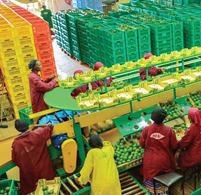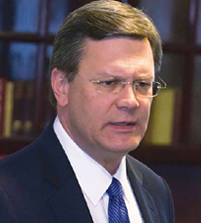Richard Fox is the current chairman of the Kenya Flower Council ; he has been extensively involved in the Kenyan horticultural sector for the past
Category: Featured Articles May – June 2018
Who is Hosea Machuki (Personal, educational and professional background)? Hosea Machuki is the Chief Executive Officer Fresh Produce Exporters Association of Kenya (FPEAK). He has
Production of flowers which does not fully meet the specifications of the market contributes to a serious loss. Almost 50% of problems encountered within the
What are the benefits of participating in an exhibition?
One of the questions that always hover our minds: why should Agrichem Africa Limited participate at the annual International Flower Trade Expo (IFTEX)?
Unlike other marketing activities, IFTEX has over the years offered a grand platform for Agrichem Africa Limited to showcase their products and services and communicate their message.
For instance, cold calling can get a bit annoying for any person who might not be in the right place to talk to you about your promotional activities. But on the other hand, IFTEX offers an opportunity for Agrichem Africa Limited to emerge and stand out at their exhibition stands and trade show booths.
Describe the horticulture industry Horticultural crops in Kenya include flowers, fruits, and vegetables. The horticulture sub-sector is one of the top foreign exchange earners for the country generating approximately US $ 1 billion annually. Currently the horticulture industry is the fastest growing agricultural sub-sector and is ranked third in terms of foreign exchange earnings from exports after tourism and tea. Horticultural industry has been one of the most dynamic agriculture sub-sectors over the last 10 years. This is attributed to the high demand for the products both locally and internationally. The sector is characterized by small-scale production (80%) on horticulture plots of less than a hectare, frequently subsistence in nature.
Horticultural crops in Kenya include flowers, fruits, and vegetables. The horticulture sub-sector is one of the top foreign exchange earners for the country generating approximately US $ 1 billion annually. Currently the horticulture industry is the fastest growing agricultural sub-sector and is ranked third in terms of foreign exchange earnings from exports after tourism and tea. Horticultural industry has been one of the most dynamic agriculture sub-sectors over the last 10 years. This is attributed to the high demand for the products both locally and internationally. The sector is characterized by small-scale production (80%) on horticulture plots of less than a hectare, frequently subsistence in nature.
Air cargo industry does see a dynamic market in flower transportation and is honing its skill to facilitate an integrated cool supply chain.
Growers in Kenya were hoping to do brisk business during this Valentine’s Day when they were caught in tangle as a logistics logjam seemed lurking around the corner due to an inbound freight crunch, causing a dearth of outbound cargo flights from Kenya. Amid the accelerating global economic recovery, cargo aircraft had diverted to more-profitable routes in Europe, the US and Asia, and away from less profitable ones in Africa. A Wall Street Journal report says that with air carriers insisting on flexibility and waiting till the last minute to commit to cargo flights, Kenya’s freight crunch around Valentine’s Day was hard to circumvent given the short life of cut flowers.
Certification responds to increasing demand for sustainability
Sustainability in the horticultural sector is essential to be able to continue producing and trading flowers and plants in a responsible manner.
Growers must ensure their international horticultural chain is more sustainable and has a concrete objective to ensure flowers and plants produced and sold are sustainable. The horticultural sector has no future without sustainable products, and the Kenyan flower sector is obliged to take the initiative as a global player.
Sustainable cultivation means that growers meet the requirements for producing with the future in mind. Sustainability is a precondition for a healthy future. Growers should work to achieve a future-proof horticultural sector, in which flowers and plants are grown and marketed with respect for people and the environment.
 Dutch Flower Group is a unique family company that specializes in the international trade of flowers and plants. With 30 individual companies, we supply all distribution channels, importing wholesalers (who supply florists) and the large-scale retail sector (including supermarket chains, DIY stores and garden centers).
Dutch Flower Group is a unique family company that specializes in the international trade of flowers and plants. With 30 individual companies, we supply all distribution channels, importing wholesalers (who supply florists) and the large-scale retail sector (including supermarket chains, DIY stores and garden centers).
Together with our marketing companies in Europe and the USA we are committed to work towards a better world. We have created 4 drivers within our CSR policy: Sustainable Floral Chain, Sustainable World, Sustainable Partnerships and Sustainable Employees. In 2018 we have started the acceleration initiative to speed up the sustainability process within the chain. We have committed ourselves to a shared ambition:
DowDuPont Agriculture Division is Now Corteva Agriscience™
The Floriculture Magazine spoke to Corteva Agriscience™ Agriculture Division of DowDuPont Chief Operating Officer Mr. James C. Collins in a round table meeting with journalists. We engaged him on the state of agriculture and how technology can be used to boost output and support food security while taking care of emerging environmental and health concerns. He was in Nairobi accompanied by other senior company staff from Africa and Middle East region.
What brings you to Kenya?  Two years ago, Dow and DuPont made a very deliberate decision to merge and create three standalone companies, including a pure play agriculture company. End of February, the company announced brand names for the three independent companies, reflecting ongoing progress towards separations to serve their consumers better. At the same time, we are focusing on building our business in sub-Saharan Africa. As part of that decision, we located our East Africa headquarters in Nairobi. We have a leadership team for East African region here — from where we are trying to build a foundation for agriculture in the region. That’s why we are placing a lot of emphasis in this part of the world.
Two years ago, Dow and DuPont made a very deliberate decision to merge and create three standalone companies, including a pure play agriculture company. End of February, the company announced brand names for the three independent companies, reflecting ongoing progress towards separations to serve their consumers better. At the same time, we are focusing on building our business in sub-Saharan Africa. As part of that decision, we located our East Africa headquarters in Nairobi. We have a leadership team for East African region here — from where we are trying to build a foundation for agriculture in the region. That’s why we are placing a lot of emphasis in this part of the world.
What does this mean to Kenya’s Agricultural Sector?
In Corteva Agriscience™, we bring together three businesses with deep connections and dedication to generations of farmers. Our new name reflects our commitment to enhancing their productivity as well as the health and well-being of the consumers they serve. Our name reflects our purpose: enriching the lives of those who produce and those who consume, ensuring progress for generations to come. With the most balanced portfolio of products in the industry, nearly a century of agronomic expertise, and an unparalleled innovation engine, we are creating a new agriculture company that will work together with the entire food ecosystem to produce a secure supply of healthy food sustainably and efficiently. Other than the regional headquarters, we have also built a state of the art seed production facility which we will be improving to higher standards, we have a research centre, that is part of the Africa Technology hub and we are investing in talent.
IFTEX is the time to refine and define your corporate culture and identity and show your brand meaning to your customers
 When it comes to branding and your exhibition stand, you only really get one chance to impress. This is not only because once the exhibition stand is on the trade show floor it cannot be modified, but also because often exhibition visitors will pass by the exhibition stand once only.
When it comes to branding and your exhibition stand, you only really get one chance to impress. This is not only because once the exhibition stand is on the trade show floor it cannot be modified, but also because often exhibition visitors will pass by the exhibition stand once only.
What’s the difference between an exhibitor who sizzles and one that fizzles?
Sometimes it’s hard to find something truly unique on the trade show floor, but an exhibitor must have a few exceptional elements that make him noteworthy. First, positioning the stand, on the first lane of the ground almost opposite the gate space allow them to stand out and appear even larger than the space itself and almost the first booth visitors see. Second, using tall, well projected colours on the wall as a projection surface is a brilliant way to keep the booth minimalistic while still communicating important key messages in a visually impactful manner that makes visitors to stop and take note. Third, the laser-tight focus on the company’s product is a welcome contrast to its graphics-heavy and display-cluttered neighbours.
